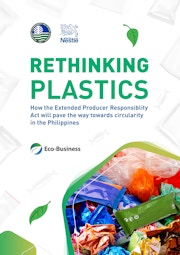
Filipinos consumed 2.15 million tonnes of plastic in 2019. Of this, only around 9 per cent were recycled, with 33 per cent being sent to sanitary landfills and open dumpsites. The other 760,000 tonnes of mismanaged plastic leaked into the open environment.
“We stand at a crossroads,” said secretary Ma. Antonia “Toni” Yulo Loyzaga of the Department of Environment and Natural Resources (DENR) during her opening remarks at the Rethinking Plastics: EPR Paving the Way Towards Circularity forum, which took place in May 2023.
“We can continue with our current patterns of consumption and waste generation, or we can choose a different
journey – a path that leads to a cleaner, healthier, more livable planet. The choice is ours and we must act now.”
Co-presented by Nestlé Philippines and the DENR – and organised by Eco-Business – the Rethinking Plastics: EPR Paving the Way Towards Circularity series of dialogues aims to spur conversation about the Philippines’ staggering waste problem and how the Extended Producer Responsibility (EPR) Act of 2022 can be a roadmap to a genuine circular plastic economy in the country.
It aims to show obliged enterprises, waste diverters and other stakeholders that the implementation of an EPR scheme is feasible. Eco-Business was given access to report on the roundtable discussions.
“This gathering of industry and policy leaders, as well as innovators, and waste management ecosystem
players, [is] crucially important to the success of the EPR [law],” continued Yulo-Loyzaga.
“We need to discuss and agree on key processes… as well as strategic alliances that we need to enforce [to] enable the country to stop packaging pollution by adopting a course towards circular economy.”
Publish your content with EB Premium
It's not about how many you reach. It's about who. Get your news, events, jobs and thought leadership seen by those who matter to you.

















